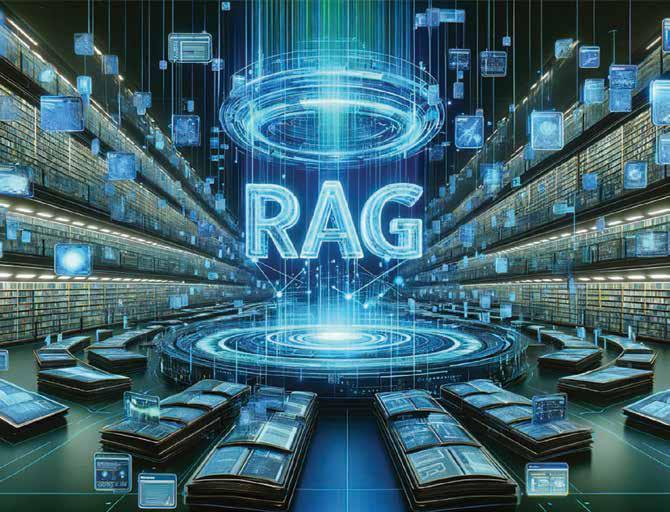Harnessing AI's full potential with Retrieval-Augmented Generation (RAG)
PCQuest
|October 2024
By enhancing the precision, responsiveness, and contextual awareness of AI applications, RAG is not just redefining the possibilities of technology but also setting a new standard for the future of enterprise AI solutions

Ever wondered how AI can talk like your best buddy, giving spot-on answers like a seasoned quiz champion? Thanks to the RetrievalAugmented Generation (RAG), that’s not just possible—it’s happening right now. Naren Narendran, Chief Scientist at Aerospike, pulls back the curtain on this groundbreaking technology.
• The Mechanics of Retrieval-Augmented Generation (RAG)
The Retrieval-Augmented Generation (RAG) system is a relatively new paradigm that has gained popularity with the rise of generative AI. It combines the strengths of large language models (LLMs) with the need for specific, context-relevant information. LLMs are trained on vast datasets, often encompassing a large portion of the Internet, which allows them to generate a wide range of responses. However, they may lack the specific, up-to-date information necessary for enterprise-level tasks.
RAG addresses this by incorporating a retrieval step before generating responses. The process starts with retrieving relevant data specific to the question or application from a designated dataset or database. This data is then fed into the LLM, which synthesizes a coherent and contextually accurate response. Essentially, the LLM uses both its general knowledge and the specific data retrieved to generate a comprehensive answer.
The retrieval step can involve various techniques such as keyword search, vector-based fuzzy search, or graph-based methods, depending on the nature of the data and the requirements of the application. The balance between retrieval and generation shifts based on the application: for general-purpose tasks, less specific retrieval might be needed, whereas tasks requiring detailed and precise information rely heavily on effective retrieval. This integration ensures that the responses are both linguistically fluent and contextually accurate, leveraging the LLM’s generative capabilities and the retrieval system’s precision.
Dit verhaal komt uit de October 2024-editie van PCQuest.
Abonneer u op Magzter GOLD voor toegang tot duizenden zorgvuldig samengestelde premiumverhalen en meer dan 9000 tijdschriften en kranten.
Bent u al abonnee? Aanmelden
MEER VERHALEN VAN PCQuest

PCQuest
The invisible intelligence powering healthcare and finance
What if your hospital's AI could think like a surgeon and your bank's software acted like a risk analyst? Inside Iksha Labs, machines aren't just smart, they're regulation-ready, real-time coworkers for the world's most demanding industries
5 mins
December 2025

PCQuest
How AI and cloud can optimize the performance and efficiency of edge devices
AI isn't just living in the cloud, it's getting its boots dirty at the edge. From oil rigs to warehouses, learn how smart tech is teaming up with cloud power to make machines faster, decisions sharper, and industries safer
2 mins
December 2025

PCQuest
Beyond automation: A shift in developer cognition
From modular code generation to knowledge-as-a-service, a new Al-human alliance is reshaping how enterprise software is built, tested, and governed. Welcome to the new age of intelligent development
5 mins
December 2025

PCQuest
Ubon SP-95
Budget Bluetooth speakers often try to pack in more than they can handle. The Ubon SP-95 takes a different route. It focuses on the basics and aims to execute them well. You get a 20W output, Bluetooth 5.3, USB and TF card playback, AUX input, FM radio, and a Type-C charging port. All of this comes at a price of Rs 1,499, which puts it in the sweet spot for students and young users who want something reliable without spending too much.
1 mins
December 2025

PCQuest
India's esports scene is about to go BOOM
India's gaming boom needs more than tournaments. It needs creators, infrastructure, pathways, and a long-term vision that treats esports as entertainment for all, not just the pro tier. JioBLAST wants to write that next chapter by blending fans, creators, and competitors into one connected ecosystem
6 mins
December 2025

PCQuest
AI's power shift begins at the edge
Cloud isn't king anymore. AI is moving home to your laptop, your office, and your private cloud. What's driving this silent shift from scale to sovereignty? The answer lies at the edge, where performance meets control
4 mins
December 2025

PCQuest
A quiet revolution under the hood
When hardware stops holding you back, imagination runs wild. From dorms to dev studios, Indian gamers are rewriting the rules not with hype, but with high frame rates, future-ready builds, and a hunger that's finally met its match.
3 mins
December 2025

PCQuest
The collaboration paradox
What if your workflow wasn't broken, but the tools were never built for your brain in the first place? A new creator-led rethink is turning chaotic feedback, endless loops, and scattered files into something surprisingly rare: peace
4 mins
December 2025

PCQuest
2025 inflection point Where hype met hard truth
2025 wasn't just another tech year. It was the year tech grew up, left behind the hype cycles, and got a real job. From autonomous AI to sovereign data bunkers, the industry finally started chasing outcomes, not headlines
4 mins
December 2025

PCQuest
The rise of Indian esports isn't luck; it's logistics
As esports in India finds mainstream momentum, a silent revolution is unfolding, shaped by smarter devices, deeper analytics, and disciplined creator ecosystems. The future isn't a bet. It's a build
4 mins
December 2025
Listen
Translate
Change font size

